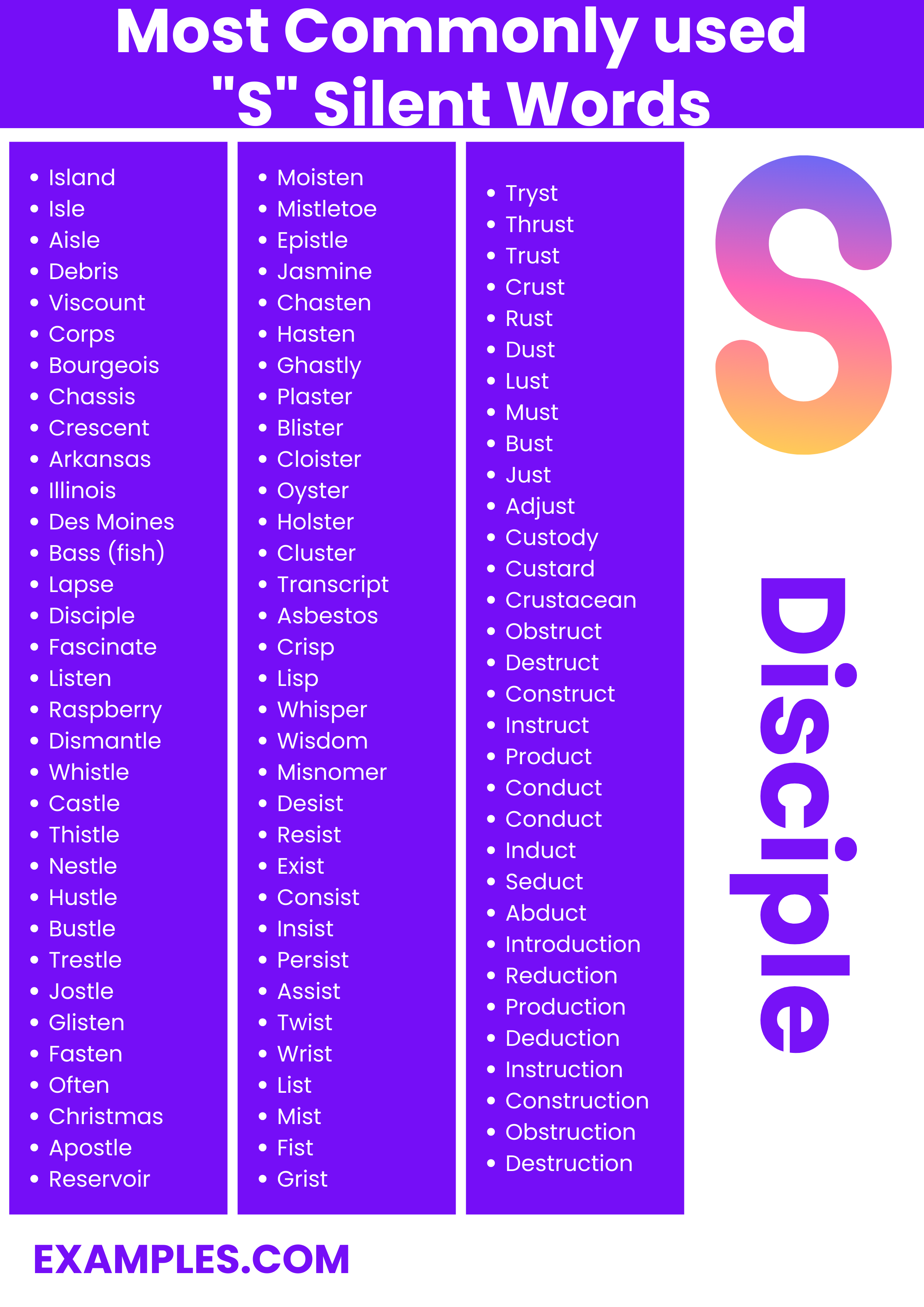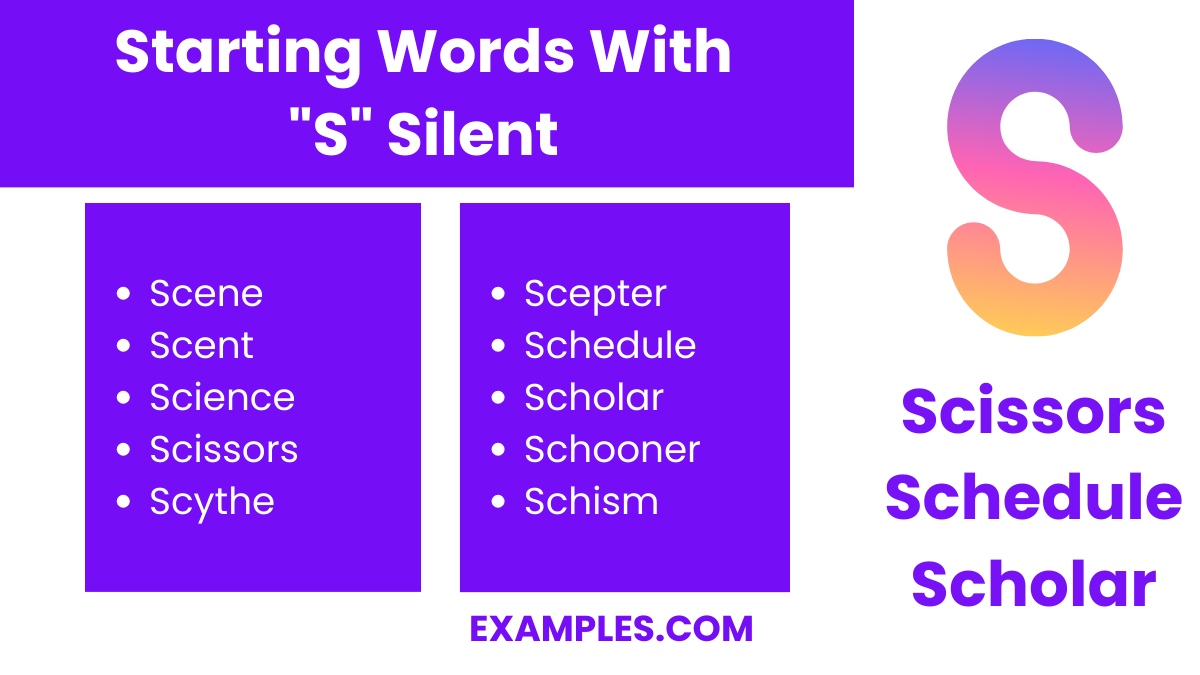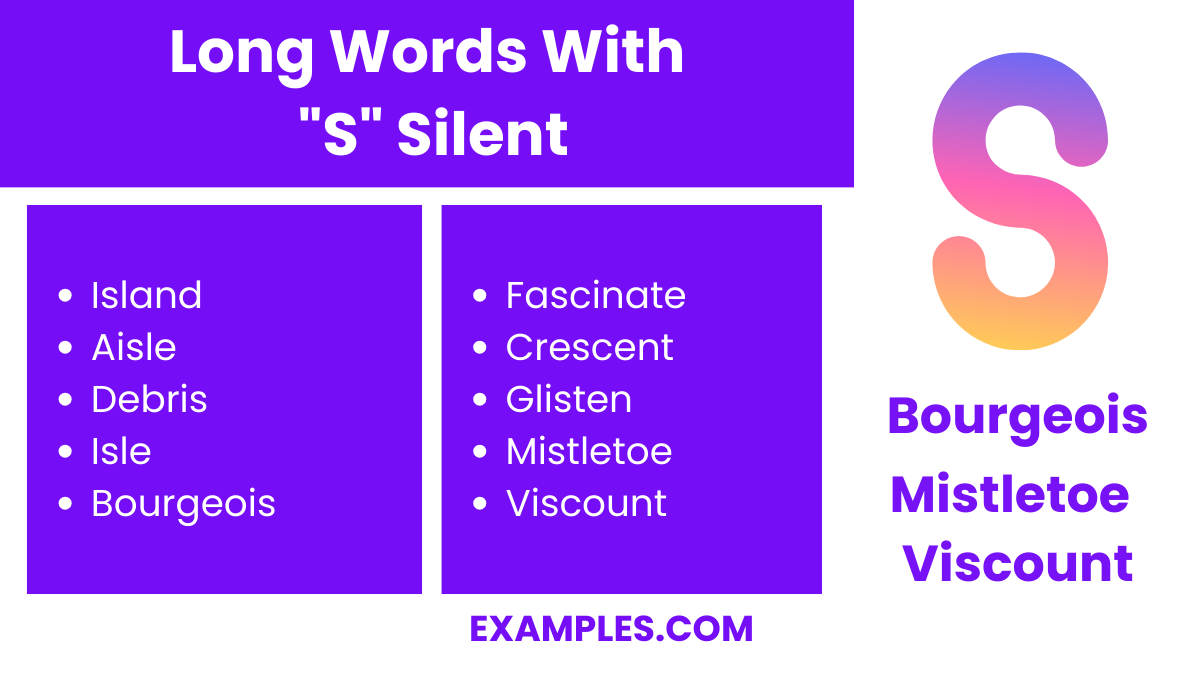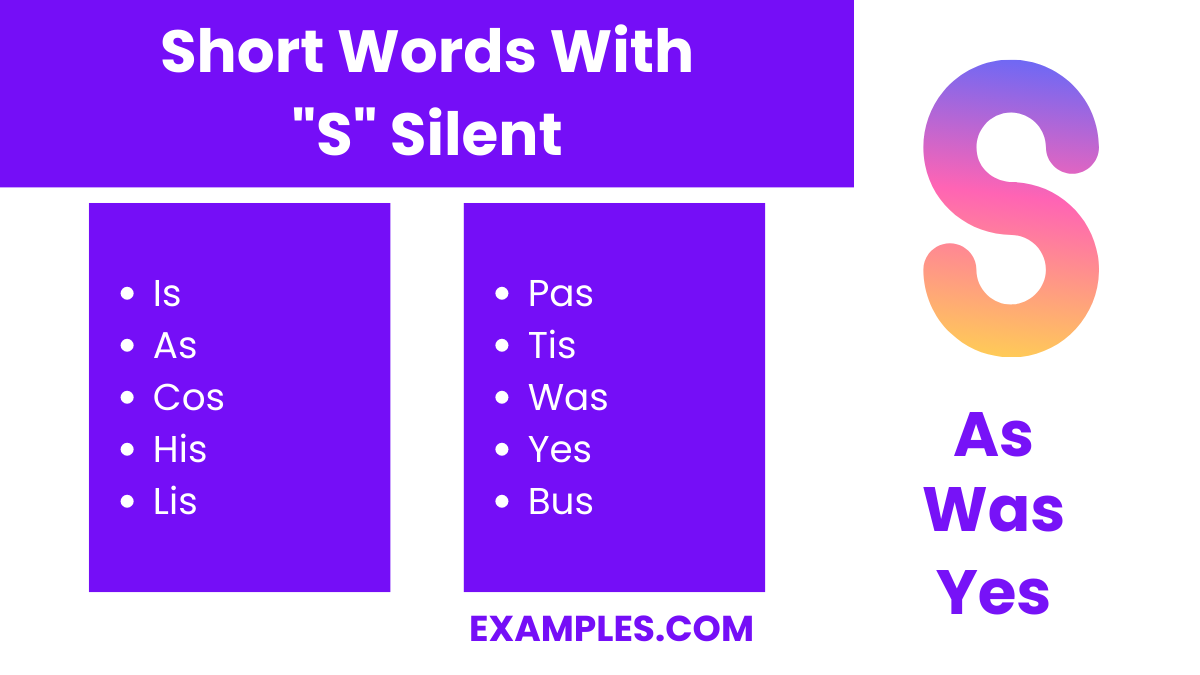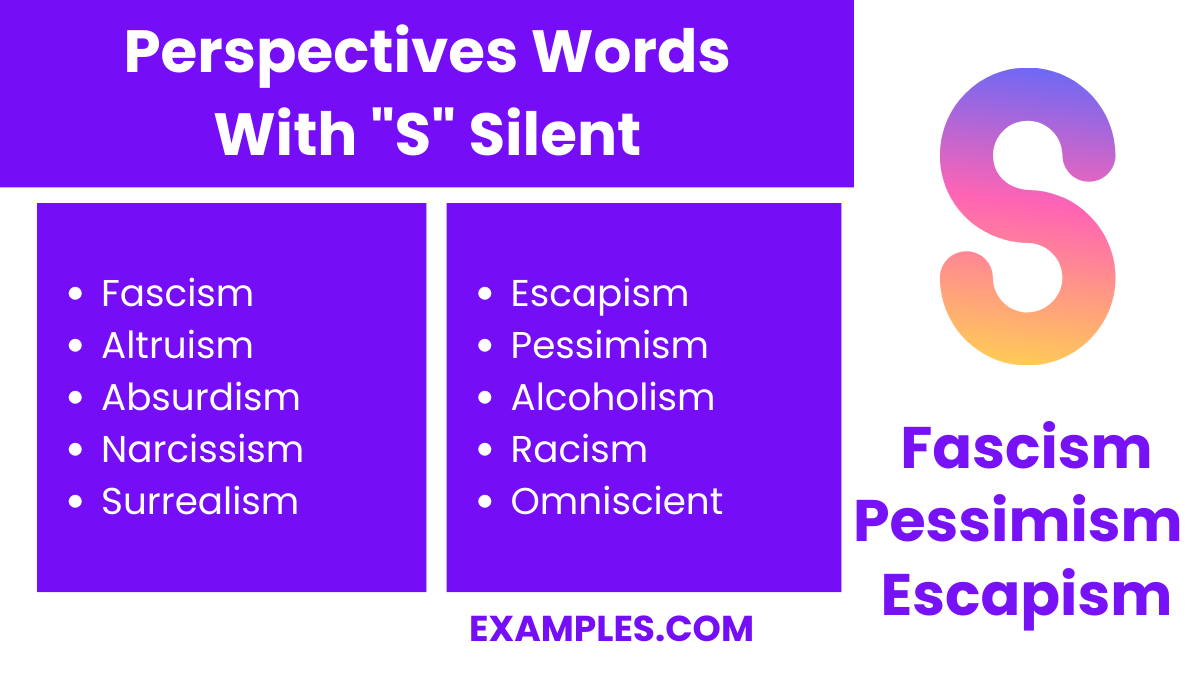450+ S Silent Words List, Meaning, PDF
The silent “S” in English words presents a fascinating linguistic feature that often goes unnoticed yet significantly impacts pronunciation and comprehension. This subtle linguistic nuance can be a hurdle for learners and a point of interest for seasoned speakers. Our exploration into silent “S” words unveils a list tailored to intrigue and educate, providing a unique insight into the complexity and beauty of English pronunciation. Perfect for educators, students, and language enthusiasts, this collection aims to demystify these silent specters and enrich your linguistic repertoire.
Download Most Commonly Used S Silent Words - PDF
100 Most Commonly used “S” Silent Words
Compiling a list of 50+ English words with a silent “S” is quite challenging due to the rarity of this phonetic phenomenon. However, I can provide a selection of words where the “S” might be silent or less pronounced in specific contexts or combinations. This list includes some words where the “S” might not be strongly articulated, especially in certain dialects, accents, or in rapid speech.
| Island | [ˈaɪ.lənd] |
| Isle | [aɪl] |
| Aisle | [aɪl] |
| Debris | [dəˈbriː] |
| Viscount | [ˈvaɪ.kaʊnt] |
| Corps | [kɔːr] |
| Bourgeois | [ˈbʊər.ʒwɑː] |
| Chassis | [ˈʃæs.i] |
| Crescent | [ˈkres.ənt] |
| Arkansas | [ˈɑːr.kən.sɔː] |
| Illinois | [ˌɪl.ɪˈnɔɪ] |
| Des Moines | [dɪ ˈmɔɪn] |
| Bass | [bæs] |
| Lapse | [læps] |
| Disciple | [dɪˈsaɪ.pəl] |
| Fascinate | [ˈfæs.ɪ.neɪt] |
| Listen | [ˈlɪs.ən] |
| Raspberry | [ˈræz.bər.i] |
| Dismantle | [dɪsˈmæn.təl] |
| Whistle | [ˈwɪs.əl] |
| Castle | [ˈkæs.əl] |
| Thistle | [ˈθɪs.əl] |
| Nestle | [ˈnes.əl] |
| Hustle | [ˈhʌs.əl] |
| Bustle | [ˈbʌs.əl] |
| Trestle | [ˈtres.əl] |
| Jostle | [ˈdʒɒs.əl] |
| Glisten | [ˈɡlɪs.ən] |
| Fasten | [ˈfɑː.sən] |
| Often | [ˈɒf.ən] or [ˈɔː.fən] |
| Christmas | [ˈkrɪs.məs] |
| Apostle | [əˈpɒs.əl] |
| Reservoir | [ˈrez.ə.vwɑːr] |
| Moisten | [ˈmɔɪs.ən] |
| Mistletoe | [ˈmɪs.əlˌtoʊ] |
| Epistle | [ɪˈpɪs.əl] |
| Jasmine | [ˈdʒæz.mɪn] |
| Chasten | [ˈtʃeɪ.sən] |
| Hasten | [ˈheɪ.sən] |
| Ghastly | [ˈɡɑːst.li] |
| Plaster | [ˈplɑː.stər] |
| Blister | [ˈblɪs.tər] |
| Cloister | [ˈklɔɪ.stər] |
| Oyster | [ˈɔɪ.stər] |
| Holster | [ˈhəʊl.stər] |
| Cluster | [ˈklʌs.tər] |
| Transcript | [ˈtræn.skɹɪpt] |
| Asbestos | [æsˈbɛstəs] |
| Crisp | [kɹɪsp] |
| Lisp | [lɪsp] |
| Whisper | [ˈwɪspər] |
| Wisdom | [ˈwɪzdəm] |
| Misnomer | [ˌmɪsˈnoʊmər] |
| Desist | [dɪˈzɪst] |
| Resist | [ɹɪˈzɪst] |
| Exist | [ɪɡˈzɪst] |
| Consist | [kənˈsɪst] |
| Insist | [ɪnˈsɪst] |
| Persist | [pəˈsɪst] |
| Assist | [əˈsɪst] |
| Twist | [twɪst] |
| Wrist | [ɹɪst] |
| List | [lɪst] |
| Mist | [mɪst] |
| Fist | [fɪst] |
| Grist | [ɡɹɪst] |
| Tryst | [tɹɪst] |
| Thrust | [θɹʌst] |
| Trust | [tɹʌst] |
| Crust | [kɹʌst] |
| Rust | [ɹʌst] |
| Dust | [dʌst] |
| Lust | [lʌst] |
| Must | [mʌst] |
| Bust | [bʌst] |
| Just | [dʒʌst] |
| Adjust | [əˈdʒʌst] |
| Custody | [ˈkʌstədi] |
| Custard | [ˈkʌstərd] |
| Crustacean | [kɹʌˈsteɪʃən] |
| Obstruct | [əbˈstɹʌkt] |
| Destruct | [dɪˈstɹʌkt] |
| Construct | [kənˈstɹʌkt] |
| Instruct | [ɪnˈstɹʌkt] |
| Product | [ˈpɹɒdʌkt] |
| Conduct | [kənˈdʌkt] |
| Conduct | [ˈkɒndʌkt] |
| Induct | [ɪnˈdʌkt] |
| Seduct | [sɪˈdʌkt] |
| Abduct | [æbˈdʌkt] |
| Introduction | [ˌɪn.tɹəˈdʌk.ʃən] |
| Reduction | [ɹɪˈdʌkʃən] |
| Production | [pɹəˈdʌkʃən] |
| Deduction | [dɪˈdʌkʃən] |
| Instruction | [ɪnˈstɹʌkʃən] |
| Construction | [kənˈstɹʌkʃən] |
| Obstruction | [əbˈstɹʌkʃən] |
| Destruction | [dɪˈstɹʌkʃən] |
| Reconstruction | [ˌɹiː.kənˈstɹʌk.ʃən] |
| Scholar | [ˈskɒl.ər] |
Starting Words With “S” Silent
Embarking on the exploration of Daily Use English Words pronunciation unveils the fascinating phenomenon of words beginning with a silent “S”. This distinctive feature often intrigues learners and challenges educators, making it a vital component of linguistic study. Understanding and mastering these words is crucial for effective communication and language teaching. For educators seeking to broaden their teaching arsenal and students aiming to enhance their pronunciation skills, this compilation serves as an invaluable resource. Here, we present ten carefully selected words that start with a silent “S”, each accompanied by a concise definition and its phonetic pronunciation, to aid in the linguistic advancement of teachers and their pupils.
- Scene [siːn] – The place where an incident in real life or fiction occurs or occurred.
- Scent [sent] – A distinctive smell, especially one that is pleasant.
- Science [ˈsaɪ.əns] – The intellectual and practical activity encompassing the systematic study of the structure and behavior of the physical and natural world through observation and experiment.
- Scissors [ˈsɪz.ərz] – A tool used for cutting, consisting of two crossing blades fixed at a pivot.
- Scythe [saɪð] – A tool used for cutting crops such as grass or wheat, with a long curved blade at the end of a long pole.
- Scepter [ˈsep.tər] – An ornamented staff carried by rulers on ceremonial occasions as a symbol of sovereignty.
- Schedule [ˈʃed.juːl] – A plan for carrying out a process or procedure, giving lists of intended events and times.
- Scholar [ˈskɒl.ər] – A specialist in a particular branch of study, especially the humanities; a distinguished academic.
- Schooner [ˈskuː.nər] – A sailing ship with two or more masts, typically with the foremast smaller than the mainmast, and having gaff-rigged lower masts.
- Schism [ˈskɪz.əm] – A split or division between strongly opposed sections or parties, caused by differences in opinion or belief.
Ending Words With “S” Silent
The silent “S” at the end of words in English presents a unique challenge and opportunity for linguistic exploration. For educators and students alike, mastering these words is essential for achieving a nuanced understanding and pronunciation of the language. This aspect of English phonetics is particularly intriguing, as it often involves words that are integral to everyday vocabulary as well as academic discourse. In this carefully curated list, we present ten words where the final “S” remains unvoiced, each accompanied by its definition and phonetic pronunciation. This selection is designed to aid teachers in enriching their instructional strategies and students in refining their pronunciation, thereby enhancing effective communication and linguistic proficiency.
- Illinois [ˌɪl.ɪˈnɔɪ] – A U.S. state renowned for its cultural contributions and major cities.
- Debris [dəˈbriː] – Scattered fragments, typically of something wrecked or destroyed.
- Corps [kɔːr] – A main subdivision of an armed force in the field, consisting of two or more divisions.
- Arkansas [ˈɑːr.kən.sɔː] – A state in the southern region of the United States noted for its geographical diversity.
- Apropos [ˌæp.rəˈpoʊ] – Being relevant or appropriate to a particular matter.
- Bourgeois [ˈbʊr.ʒwɑː] – Relating to or characteristic of the social middle class.
- Chassis [ˈʃæs.i] – The base frame of a vehicle or other mechanical system.
- Finesse [fɪˈnɛs] – Skillful maneuvering or subtlety in handling a situation.
- Mores [ˈmɔː.reɪz] – The essential or characteristic customs and conventions of a community.
- Autopsies [ˈɔː.təp.siz] – Post-mortem examinations to discover the cause of death or the extent of disease.
Middle Words With “S” Silent
The silent “S” nestled within words adds a layer of sophistication and complexity to English pronunciation, making it a captivating subject for linguistic exploration. This phenomenon is not only a testament to the rich tapestry of the language but also a crucial element for educators and students to master for precise communication. In this segment, we delve into words where the “S” positioned in the middle remains unvoiced, presenting a unique challenge to learners. Our curated list includes ten such words, each accompanied by a brief definition and its phonetic pronunciation. This collection is designed to enhance teaching methodologies and aid students in navigating the intricacies of English pronunciation, thereby fostering a deeper understanding and appreciation of the language’s nuanced nature.
- Mischievous [ˈmɪstʃɪvəs] – Causing or showing a fondness for causing trouble in a playful way.
- Psychology [saɪˈkɒlədʒi] – The scientific study of the human mind and its functions.
- Conscience [ˈkɒnʃəns] – An inner feeling acting as a guide to the rightness or wrongness of one’s behavior.
- Crescendo [krəˈʃɛndəʊ] – A gradual increase in loudness in a piece of music.
- Glisten [ˈɡlɪs.ən] – To shine with a sparkling light.
- Fascinate [ˈfæs.ɪ.neɪt] – To attract and hold attentively by a unique power or beauty.
- Crescent [ˈkrɛs.ənt] – Something shaped like a crescent moon.
- Reservoir [ˈrɛz.ər.vwɑr] – A large natural or artificial lake used as a source of water supply.
- Descent [dɪˈsɛnt] – The action of moving downward, dropping, or falling.
- Thistle [ˈθɪs.əl] – A plant with prickly leaves and stalks, typically having a purple flower.
Long Words With “S” Silent
In the vast expanse of the English language, certain long words carry the intriguing characteristic of a silent “S”. These words not only challenge the conventional rules of pronunciation but also enrich the lexicon with their uniqueness. For educators and students alike, understanding and mastering these words can significantly enhance linguistic and communication skills proficiency. Presented below is a list of ten long words where the “S” remains unvoiced, each accompanied by a concise definition and its phonetic pronunciation. This collection aims to support teachers in their instructional endeavors and students in their journey to articulate English more effectively.
- Island [ˈaɪ.lənd] – A landmass entirely surrounded by water.
- Aisle [aɪl] – A passageway between rows of seats or shelves.
- Debris [dəˈbriː] – Scattered pieces of waste or remains.
- Isle [aɪl] – A small island.
- Bourgeois [ˈbʊəʒ.wɑː] – Pertaining to the middle class, typically with reference to its perceived materialistic values.
- Fascinate [ˈfæs.ɪ.neɪt] – To attract and hold attentively.
- Crescent [ˈkrɛs.ənt] – Shaped like a moon in its first or last quarter.
- Glisten [ˈɡlɪs.ən] – To shine by reflecting light from a wet or smooth surface.
- Mistletoe [ˈmɪs.əl.toʊ] – A plant with white berries, traditionally used as a Christmas decoration.
- Viscount [ˈvaɪ.kaʊnt] – A rank in the British peerage system, below an earl and above a baron.
Short Words With “S” Silent
Short words with a silent “S” offer a fascinating glimpse into the idiosyncrasies of English pronunciation, presenting both challenges and opportunities for learners. These words, despite their brevity, are crucial for students aiming to refine their pronunciation and for teachers striving to provide comprehensive linguistic education. Among these are several funny words that, with their silent “S”, add an element of amusement to the learning process. Herein is a list of ten such words where the “S” remains unheard, each with a definition and phonetic pronunciation, crafted to enhance linguistic understanding and communication clarity for educators and their pupils.
- Is [ɪz] – Third person singular present of “be”.
- As [əz, æz] – Used in comparisons to refer to the extent or degree of something.
- Cos [kɒz] – Short for because; used informally.
- His [hɪz] – Belonging to or associated with a male person.
- Lis [liː] – A stylized representation of the iris, used in heraldry.
- Pas [pɑː] – A step or series of steps in ballet.
- Tis [tɪz] – It is.
- Was [wəz, wɒz] – Second person singular past, plural past, and past subjunctive of “be”.
- Yes [jɛs] – Used to give an affirmative response.
- Bus [bʌs] – A large motor vehicle carrying passengers by road.
Perspectives Words With “S” Silent
Words that offer perspectives or viewpoints, yet contain a silent “S”, enrich conversations and written expressions with depth and nuance. Among these, sight words, often with their silent “S”, play a pivotal role in language acquisition, making them instrumental for educators teaching language arts and for students learning to articulate complex ideas. Below is a curated list of ten perspective-laden words with a silent “S”, each provided with its meaning and phonetic pronunciation. This selection is intended to broaden the vocabulary and enhance the expressive capabilities of teachers and students alike.
- Fascism [ˈfæʃ.ɪ.zəm] – A political system based on a centralized autocratic government and severe economic and social regimentation.
- Altruism [ˈæl.tru.ɪ.zəm] – The belief in or practice of disinterested and selfless concern for the well-being of others.
- Absurdism [əbˈsɜr.dɪ.zəm] – The belief that human beings exist in a purposeless, chaotic universe.
- Narcissism [ˈnɑr.sɪ.sɪ.zəm] – Excessive interest in or admiration of oneself and one’s physical appearance.
- Surrealism [səˈriː.ə.lɪ.zəm] – A 20th-century avant-garde movement in art and literature that sought to release the creative potential of the unconscious mind.
- Escapism [ɪˈskeɪ.pɪ.zəm] – The tendency to seek distraction and relief from unpleasant realities, especially by seeking entertainment or engaging in fantasy.
- Pessimism [ˈpes.ɪ.mɪ.zəm] – A tendency to see the worst aspect of things or believe that the worst will happen.
- Alcoholism [ˈæl.kə.hɒl.ɪ.zəm] – Addiction to the consumption of alcoholic drink; alcohol dependency.
- Racism [ˈreɪ.sɪ.zəm] – Prejudice, discrimination, or antagonism directed against someone of a different race based on the belief that one’s own race is superior.
- Omniscient [ɒmˈnɪs.i.ənt] – Knowing everything, often used in discussions about literature, philosophy, or theology.
In conclusion, Navigating the silent “S” in words unveils the intricate beauty of English pronunciation, presenting educators and students with both challenges and opportunities for growth. Mastering these words enhances linguistic precision, enriches vocabulary, and fosters a deeper appreciation for the language’s complexity. This exploration not only bolsters communication skills but also encourages a more mindful engagement with the spoken and written word.



